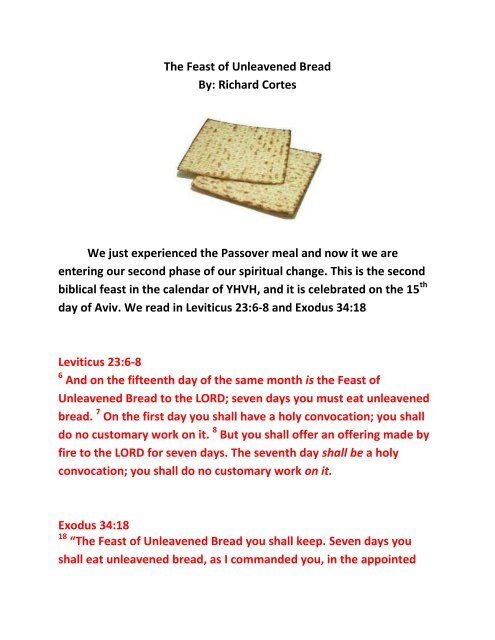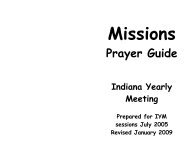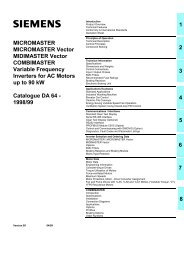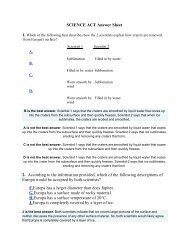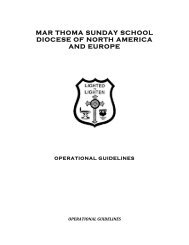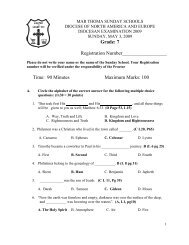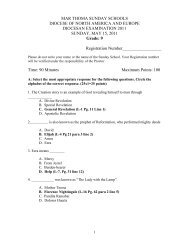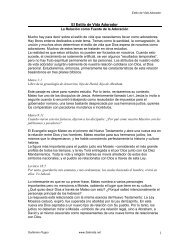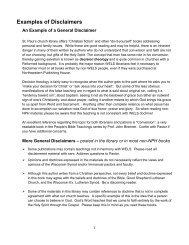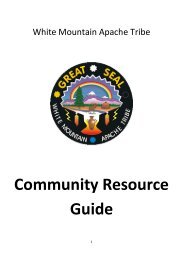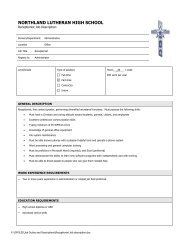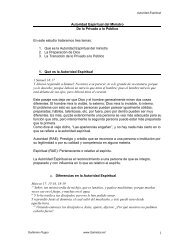The Feast of Unleavened Bread By: Richard Cortes We ... - Finalweb
The Feast of Unleavened Bread By: Richard Cortes We ... - Finalweb
The Feast of Unleavened Bread By: Richard Cortes We ... - Finalweb
You also want an ePaper? Increase the reach of your titles
YUMPU automatically turns print PDFs into web optimized ePapers that Google loves.
<strong>The</strong> <strong>Feast</strong> <strong>of</strong> <strong>Unleavened</strong> <strong>Bread</strong><strong>By</strong>: <strong>Richard</strong> <strong>Cortes</strong><strong>We</strong> just experienced the Passover meal and now it we areentering our second phase <strong>of</strong> our spiritual change. This is the secondbiblical feast in the calendar <strong>of</strong> YHVH, and it is celebrated on the 15 thday <strong>of</strong> Aviv. <strong>We</strong> read in Leviticus 23:6-8 and Exodus 34:18Leviticus 23:6-86 And on the fifteenth day <strong>of</strong> the same month is the <strong>Feast</strong> <strong>of</strong><strong>Unleavened</strong> <strong>Bread</strong> to the LORD; seven days you must eat unleavenedbread. 7 On the first day you shall have a holy convocation; you shalldo no customary work on it. 8 But you shall <strong>of</strong>fer an <strong>of</strong>fering made byfire to the LORD for seven days. <strong>The</strong> seventh day shall be a holyconvocation; you shall do no customary work on it.Exodus 34:1818 “<strong>The</strong> <strong>Feast</strong> <strong>of</strong> <strong>Unleavened</strong> <strong>Bread</strong> you shall keep. Seven days youshall eat unleavened bread, as I commanded you, in the appointed
time <strong>of</strong> the month <strong>of</strong> Abib; for in the month <strong>of</strong> Abib you came outfrom Egypt.<strong>The</strong> feast <strong>of</strong> unleavened bread is celebrated for 7 daysimmediately after the Passover. God commanded All Israel tocelebrate this feast as well as all <strong>of</strong> the rest <strong>of</strong> them. Let us read inLeviticus 23:1-2Leviticus 23:1-21 And the LORD spoke to Moses, saying, 2 “Speak to the children <strong>of</strong>Israel, and say to them: ‘<strong>The</strong> feasts <strong>of</strong> the LORD, which you shallproclaim to be holy convocations, these are My feasts.As we just read; the feasts are not Jewish feast but rather theyare God’s feast. Each <strong>of</strong> these feasts represents the work <strong>of</strong> ourMessiah in our lives. In other words, they represent what He did forus, and how we are to be transformed. Passover is a requirementbefore we can attempt to be transformed. <strong>Unleavened</strong> bread is thesecond step to our spiritual growth. After accepting the Passoverblood we must die to sin. Let us read what Paul wrote:Romans 6: 1-41 What shall we say then? Shall we continue in sin that grace mayabound? 2 Certainly not! How shall we who died to sin live any longer
in it? 3 Or do you not know that as many <strong>of</strong> us as were baptized intoChrist Jesus were baptized into His death? 4 <strong>The</strong>refore we were buriedwith Him through baptism into death, that just as Christ was raisedfrom the dead by the glory <strong>of</strong> the Father, even so we also should walkin newness <strong>of</strong> life.Romans 6: 5-65 For if we have been united together in the likeness <strong>of</strong> His death,certainly we also shall be in the likeness <strong>of</strong> His resurrection, 6 knowingthis, that our old man was crucified with Him, that the body <strong>of</strong> sinmight be done away with, that we should no longer be slaves <strong>of</strong> sin.Romans 6: 15-1615 What then? Shall we sin because we are not under law but undergrace? Certainly not! 16 Do you not know that to whom you presentyourselves slaves to obey, you are that one’s slaves whom you obey,whether <strong>of</strong> sin leading to death, or <strong>of</strong> obedience leading torighteousness?Paul is not talking about some future event, but rather he isinstructing the people how to walk in their present lives. Look at whathe writes here:
Romans 6: 17-1917 But God be thanked that though you were slaves <strong>of</strong> sin, yet youobeyed from the heart that form <strong>of</strong> doctrine to which you weredelivered. 18 And having been set free from sin, you became slaves <strong>of</strong>righteousness. 19 I speak in human terms because <strong>of</strong> the weakness <strong>of</strong>your flesh. For just as you presented your members as slaves <strong>of</strong>uncleanness, and <strong>of</strong> lawlessness leading to more lawlessness, so nowpresent your members as slaves <strong>of</strong> righteousness for holiness.Notice that Paul uses the word “Now” in verse 19 signifying apresent moment. It is for us to walk now not after you die. When weaccept the Passover Lamb (Yeshua <strong>The</strong> Messiah), we die to the law <strong>of</strong>sin and death. In other words, we no longer serve the law <strong>of</strong> sin anddeath, but rather we become bonded with the Law <strong>of</strong> Righteousnessleading to life. Let us read:Romans 7: 4-54 <strong>The</strong>refore, my brethren, you also have become dead to the lawthrough the body <strong>of</strong> Christ, that you may be married to another—toHim who was raised from the dead, that we should bear fruit toGod. 5 For when we were in the flesh, the sinful passions which werearoused by the law were at work in our members to bear fruit todeath.How do we know which law Paul is talking about?
Romans 8: 22 For the law <strong>of</strong> the Spirit <strong>of</strong> life in Christ Jesus has made me free fromthe law <strong>of</strong> sin and death.In here Paul is contrasting the Law <strong>of</strong> Spirit <strong>of</strong> life (<strong>The</strong> writtenLaw <strong>of</strong> Moses) vs. the law <strong>of</strong> sin and death (No Law period). Unlikethe law <strong>of</strong> sin and death the written Law <strong>of</strong> Moses is alwaysassociated with:1) LibertyPsalms 119: 44-4544 So shall I keep Your law continually,Forever and ever.45 And I will walk at liberty,for I seek Your precepts.2) LifePsalms 119: 50-5150 This is my comfort in my affliction,For Your word has given me life.51 <strong>The</strong> proud have me in great derision,Yet I do not turn aside from Your law.Psalms 119: 9393 I will never forget Your precepts,For by them You have given me life.
3) TruthPsalms 119: 142142 Your righteousness is an everlasting righteousness,and Your law is truth.4) PeacePsalms 94: 12-1312 Blessed is the man whom You instruct, O LORD,And teach out <strong>of</strong> Your law,13 That You may give him rest from the days <strong>of</strong> adversity,Until the pit is dug for the wicked.Psalms 119: 165165 Great peace have those who love Your law,And nothing causes them to stumble.It is in the feast <strong>of</strong> unleavened bread that we bury our oldnature, and look forward to a new person. To properly understandthis let us look at the foundation <strong>of</strong> the word unleavened. <strong>The</strong>Hebrew word for unleavened is:H4682מּצהmatsts hmats-tsaw'From H4711 in the sense <strong>of</strong> greedily devouring for sweetness;properly sweetness; concretely sweet (that is, not soured or bitteredwith yeast); specifically an unfermented cake or loaf, or (elliptically)the festival <strong>of</strong> Passover (because no leaven was then used): -unleavened (bread, cake), without leaven.
Properly said the word means bread without bitter yeast. Bitteryeast represents sin, and everything that advocates it. Yeshua (Jesus)spoke regarding this in the Gospels. Let us turn to Matthew:Matthew 16:66 <strong>The</strong>n Jesus said to them, “Take heed and beware <strong>of</strong> the leaven <strong>of</strong> thePharisees and the Sadducees.”7 And they reasoned among themselves, saying, “It is because wehave taken no bread.”Matthew 16:11-1211 How is it you do not understand that I did not speak to youconcerning bread?—but to beware <strong>of</strong> the leaven <strong>of</strong> the Pharisees andSadducees.” 12 <strong>The</strong>n they understood that He did not tell them tobeware <strong>of</strong> the leaven <strong>of</strong> bread, but <strong>of</strong> the doctrine <strong>of</strong> the Phariseesand Sadducees.Luke 12:11 In the meantime, when an innumerable multitude <strong>of</strong> people hadgathered together, so that they trampled one another, He began tosay to His disciples first <strong>of</strong> all, “Beware <strong>of</strong> the leaven <strong>of</strong> the Pharisees,which is hypocrisy.<strong>The</strong>se are the things that we are supposed to be burying duringthis feast. <strong>We</strong> are supposed to look inside ourselves, and find theleaven that needs to be buried. Look at what YHVH commanded us todo during this feast. <strong>We</strong> read in Exodus 12:
Exodus 12:1919 For seven days no leaven shall be found in your houses, sincewhoever eats what is leavened, that same person shall be cut <strong>of</strong>f fromthe congregation <strong>of</strong> Israel, whether he is a stranger or a native <strong>of</strong> theland. 20 You shall eat nothing leavened; in all your dwellings you shalleat unleavened bread.’”<strong>The</strong> spiritual meaning <strong>of</strong> the feast <strong>of</strong> unleavened bread is our oldnature dying. YHVH commanded us to celebrate this feast because itrepresents what our Messiah has done for us. Just as He was buriedwith our sins we must learn to bury ourselves with Him daily. Yeshuacame to abolish sin and death not the Law <strong>of</strong> Moses (i.e. Law <strong>of</strong> God).Let us read:2 Timothy 1: 9-109 who has saved us and called us with a holy calling, not according toour works, but according to His own purpose and grace which wasgiven to us in Christ Jesus before time began, 10 but has now beenrevealed by the appearing <strong>of</strong> our Savior Jesus Christ, who hasabolished death and brought life and immortality to light through thegospelTitus 2: 13-1413 looking for the blessed hope and glorious appearing <strong>of</strong> our greatGod and Savior Jesus Christ, 14 who gave Himself for us, that He mightredeem us from every lawless deed and purify for Himself His ownspecial people, zealous for good works.
“Lawless deed” means without law. As we have learned in thePassover teaching, law is Hebrew word torah (H8451), which meansprecepts and statutes. <strong>The</strong>se precepts and statures are the teachingand instructions <strong>of</strong> YHVH. <strong>The</strong> antonym <strong>of</strong> the word law is lawless. Soin other words, Yeshua came to redeem us from our lawless nature,the nature that rejects the teaching and instructions <strong>of</strong> YHVH.<strong>The</strong> apostle Paul concludes by endorsing the celebration <strong>of</strong> thefeast <strong>of</strong> unleavened bread to the church <strong>of</strong> Corinth (a Gentile church).Let us read:1 Corinthians 5: 6-86 Your glorying is not good. Do you not know that a little leavenleavens the whole lump? 7 <strong>The</strong>refore purge out the old leaven, thatyou may be a new lump, since you truly are unleavened. For indeedChrist, our Passover, was sacrificed for us. [c] 8 <strong>The</strong>refore let us keepthe feast, not with old leaven, nor with the leaven <strong>of</strong> malice andwickedness, but with the unleavened bread <strong>of</strong> sincerity and truth.Finally, we read in Acts 20 about the feast being celebratedamong believers.Acts 20: 66 But we sailed away from Philippi after the Days <strong>of</strong> <strong>Unleavened</strong><strong>Bread</strong>, and in five days joined them at Troas, where we stayed sevendays.In conclusion, the feast <strong>of</strong> unleavened bread is for ALL believersin Messiah. As we read this feast marks the end <strong>of</strong> our old nature, andprepares us for the new nature. <strong>The</strong> entire biblical feasts are YHVH
not Jewish. <strong>The</strong>y represent the work <strong>of</strong> our Messiah. <strong>We</strong> mustapproach these feasts with a circumcised heart, and an open mind.Let us rejoice with what our God has given us to walk on. <strong>We</strong> willcontinue our next stage <strong>of</strong> spiritual growth with the feast <strong>of</strong> Firstfruits. May the LORD bless you and keep you.Shalom


